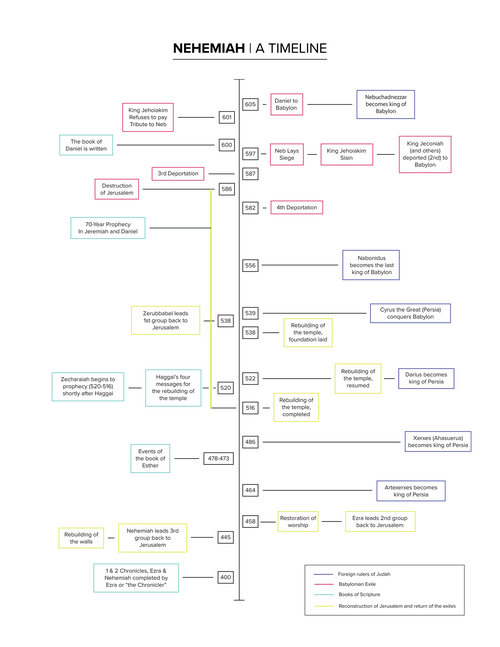Nehemiah : WK 2 - MON
Tears
Nehemiah 1:2-4
Hanani, one of my brothers, came to visit me with some other men who had just arrived from Judah. I asked them about the Jews who had returned there from captivity and about how things were going in Jerusalem.
They said to me, “Things are not going well for those who returned to the province of Judah. They are in great trouble and disgrace. The wall of Jerusalem has been torn down, and the gates have been destroyed by fire.”
When I heard this, I sat down and wept.
Two important points stand out from today’s verses. First, Nehemiah listened.
We’ve discussed the importance of asking great questions. However, this matters little if you don’t listen. We have all participated in a class where the professor poses a question with the clear intention of answering it themselves. The brilliance of great questions lies in the listening that must follow. Nehemiah asked, and then he listened.
Secondly, saying that Nehemiah listened doesn’t capture the whole story. He listened deeply, not just with his ears, but with his heart. His question has flipped a switch and prompted a heart-wrenching story. This can only be true because Nehemiah cares profoundly about the Hebrew faith and the history of God’s people.
We can only conjecture why Nehemiah remained in Susa while others departed for the homeland. Did he stay out of selfish inclination and a desire to maintain his powerful position? Was he hesitant to embark on such a dangerous journey, many miles into the unknown, preferring the comforts and safety of routine? Or did he prayerfully labor over the calling of Yahweh, only to conclude that he must continue where God had already stationed him? Either way, he is now deeply moved by the plight of his people and the smoldering rubble of the city.
Here we find an important principle. Oftentimes, God illuminates our next steps by bringing tears to our eyes. If you are considering God’s calling and the mission He might have for your life, a helpful indicator is your answer to the question, “What makes you weep?”
Whether Nehemiah remains the cupbearer out of avoidance or by calling, his emotional reaction to this conversation spurs him to action. The stirring of the Holy Spirit prevents him from staying passive. He must respond. But how?
Nehemiah 1:2-4
Hanani, one of my brothers, came to visit me with some other men who had just arrived from Judah. I asked them about the Jews who had returned there from captivity and about how things were going in Jerusalem.
They said to me, “Things are not going well for those who returned to the province of Judah. They are in great trouble and disgrace. The wall of Jerusalem has been torn down, and the gates have been destroyed by fire.”
When I heard this, I sat down and wept.
Two important points stand out from today’s verses. First, Nehemiah listened.
We’ve discussed the importance of asking great questions. However, this matters little if you don’t listen. We have all participated in a class where the professor poses a question with the clear intention of answering it themselves. The brilliance of great questions lies in the listening that must follow. Nehemiah asked, and then he listened.
Secondly, saying that Nehemiah listened doesn’t capture the whole story. He listened deeply, not just with his ears, but with his heart. His question has flipped a switch and prompted a heart-wrenching story. This can only be true because Nehemiah cares profoundly about the Hebrew faith and the history of God’s people.
We can only conjecture why Nehemiah remained in Susa while others departed for the homeland. Did he stay out of selfish inclination and a desire to maintain his powerful position? Was he hesitant to embark on such a dangerous journey, many miles into the unknown, preferring the comforts and safety of routine? Or did he prayerfully labor over the calling of Yahweh, only to conclude that he must continue where God had already stationed him? Either way, he is now deeply moved by the plight of his people and the smoldering rubble of the city.
Here we find an important principle. Oftentimes, God illuminates our next steps by bringing tears to our eyes. If you are considering God’s calling and the mission He might have for your life, a helpful indicator is your answer to the question, “What makes you weep?”
Whether Nehemiah remains the cupbearer out of avoidance or by calling, his emotional reaction to this conversation spurs him to action. The stirring of the Holy Spirit prevents him from staying passive. He must respond. But how?
- Do you have a favorite comedian? If so, who is it? What makes you laugh?
- What makes you angry?
- What circumstances make you cry?
- What could God be communicating or requesting from you through these responses?


No Comments